初中英语延续性动词与非延续性动词
初中英语动词及动词短语考点
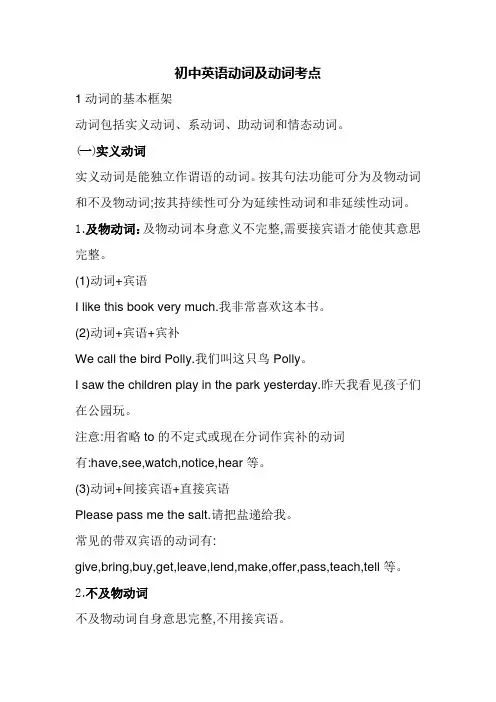
初中英语动词及动词考点1动词的基本框架动词包括实义动词、系动词、助动词和情态动词。
(一)实义动词实义动词是能独立作谓语的动词。
按其句法功能可分为及物动词和不及物动词;按其持续性可分为延续性动词和非延续性动词。
1.及物动词:及物动词本身意义不完整,需要接宾语才能使其意思完整。
(1)动词+宾语I like this book very much.我非常喜欢这本书。
(2)动词+宾语+宾补We call the bird Polly.我们叫这只鸟Polly。
I saw the children play in the park yesterday.昨天我看见孩子们在公园玩。
注意:用省略to的不定式或现在分词作宾补的动词有:have,see,watch,notice,hear等。
(3)动词+间接宾语+直接宾语Please pass me the salt.请把盐递给我。
常见的带双宾语的动词有:give,bring,buy,get,leave,lend,make,offer,pass,teach,tell等。
2.不及物动词不及物动词自身意思完整,不用接宾语。
Horses run fast.马跑得快。
(1)有些动词既可作及物动词又可作不及物动词。
We study English.我们学习英语。
(及物动词)We study hard.我们努力学习。
(不及物动词)(2)有些不及物动词与一些别的词搭配在一起构成动词短语,它的作用相当于一个及物动词。
①动词+介词Listen to the teacher carefully.仔细听老师讲。
此类动词短语后面的宾语无论是名词还是代词,都只能放在介词后面,不能放在动词和介词之间。
②动词+副词+介词Let’s go on with our work!让我们继续我们的工作吧!He gets along well with his classmates.他与他的同学们相处得很好。
浅析延续性动词与非延续性动词在现在完成时态中的活用
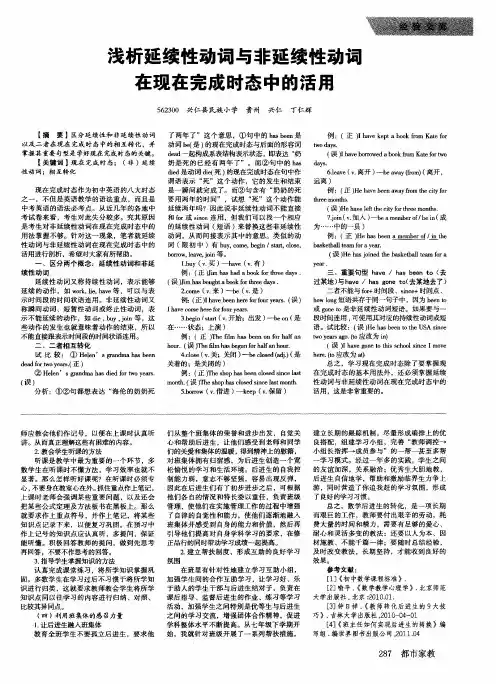
【 摘 要 】区分延 续性 和非延续性动词 了两 年了”这个 意思,①句 中的 h a s b e e n是 例 :(正 ) I h a v e k e p t a b o o kf r o mK a t ef o r 以及二者在现在 完成时态 中的相互转化 。并 动词 b wod a y s . e f 是) 的现在完成时态与后 面的形容词 t 掌握其重要 句型是 学好现在完成 时态的关键 。 d e a d一起构成系表结构表示状态,即表达 “ 奶 ( 误) I h a v e b o r r o w e d a b o o k f r o mK a t e f o r t w o 【 关键词 】 现在 完成时 态; ( 非) 延续 奶是 死的 已经有 两年 了”。而 ②句 中的 h a y s . a s d 性 动 词 ;相 互 转化 d i e d是动词 d i e ( 死) 的现在完成时态在旬 中作 6 . 1 e a v e ( v . 离开 ) 一b e a w a y ( f r o m ) ( 离开, 谓语表示 “ 死”这个动作 ,它 的发生 和结束 远离 ) 现在完成 时态作为初 中英语 的八 大时态 是一瞬间就完成 了。而② 句含有 “ 奶奶 的死 例 :f 正) He h a v eb e e na w a y f r o mt h e c i t y f o r h r e emo n t h s . 之 一,不但 是英语教学 的语法 重点 ,而且是 要用两年 的时间”,试想 “ 死”这个动 作能 t 中考英语的语法必考点 。从近几 年的各地中 延续两年吗?因此说非延续性动词不 能直接 ( 误) He h a v e l e f t t h e c i t y f o r t h r e e m o n t h s . 考试 卷来 看 ,考生对此失分较 多。究其 原因 和 f 0 r 或s i n c e连用 ,但我们可 以找一个 相应 7 . j o i n ( v . 加入 ) —b e a m e m b e r o f / b ei n ( 成 是考 生对 非延续性动词在现在完 成时态中的 的延续性动词 ( 短语 )来替换这些非延续性 为……中的一员 ) 用法 掌握不够。针对这一 现象 ,笔者 就延续 动词 ,从 而间接表示其 中的意思。类 似的动 例 :( 正 ) He h a s b e e n am e m b e r o f / i nt h e a s k e t b a l l t e a mf o ray e a r . 性动词 与非延续性动词在现在完成 时态中的 词 ( 限初 中 )有 b u y , c o m e , b e g i n , s t a r t , d o s e , b 活用进行剖析 ,希望对大家有所帮助 。 b o r r o w , l e a v e , j o i n 等。 ( 误) He h a s j o i n e d t h e b a s k e t b a l l t e a m f o r a 1 . b u y( v . 买 )一 b a v e( v . 有) 区分两个概念:延续性动词和 非延 y e a r. 续 性 动词 例 :( 正1 J i m h a s h a d a b o o kf o r t h r e e c l a y s . 三 、重 要 句 型 h a v e/h a s b e e n t o( 去 过某地 ) 与h a v e/h a s g o r  ̄ o t o ( 去某地去了) 延续性动词 又称持续性动词 ,表示 能够 f 误) J i mh a s l  ̄u g h t ab o o kf o r t h r e e d a y s . 延续 的动作 ,如 w o r k , l i e , h a v e 等 ,可 以与表 2 . c o me( v . 来) e( v . 是) 二者不能与 f o r +时间段、s i n c e +时间点 、 示时 间段 的时间状语连用 。非延续性 动词又 例: ( 正) I h a v e b e e n h e r e f o r f o u r y e a r s .( 误) h o w l o n g 短语共存于同一句子中,因为 b e e n t o a v eo o r t l eh e r ef o r f o u ry e a r s . 或g o n e t o是 非 延 续 性 动 词 短 语 。如 果 要 与 一 称瞬 间动词、短 暂性动词或终止 性动词,表 Ih 示不能延续 的动作 ,如 d i e, b u y, j o i n等,这 3 . b e g i n/ s 切 n( v . 开 始 ;出发 ) —t ' e o n( 是 段时间连用 , 可使用其对应 的持续性动词或短 语 。试比较 :( 误) He h a s b e e nt ot h e U S A s i n e l  ̄ 些动作 的发生也就意味着动作 的结束 , 所以 在……状态 ;上演 ) 不能直接跟表示时间段的时间状语连用。 例 :(正 1 T h ef i l m h a s b e e n O nf o r h a l f a n t w o y e a r s a g o . ( t o 应改为 i n ) 二 、二 者 相 互 转 化 h o u r . f 误 e i f l mh a s b e g u n f o r h a l f a n h o u r . ( 误 ) I h a v e g o n e t o t h i s s c h o o l s i n c e I m o v e 试 比 较:① H e l e n ’s g r a n d m a h a s b e e n 4 . c l o s e( v . 关;关 闭 ) —b e d o s e d( a d j . ) ( 是 h e r e . ( t o 应改为 a l 1 d e a df o r t w o y e a r s . ( 正) 关着的 ;是关闭的 ) 总之 ,学习现在完成 时态 除了要掌握现 ②H e l e n ’s g r a n d m a h a s d i e d f o r t w o y e a r s . 例 :( 正) T h e s h o ph a s b e e n do s e d s i n c el a s t 在完成 时态 的基本用法外 ,还必须掌握延续 ( 误) mo n t h . f 误) T h e s h o p h a s c l o s e d s i n c e l a s t m o n t h . 性动词 与非延续性 动词在 现在完 成时态中的 活用 ,这是非常重要的。 分析: ① ②句都想表 达 “ 海 伦的奶奶死 5 . b o r r o w( v . 借进 ) —k e e p( v . 保留)
初中英语现在完成时延续动词与非延续动词的转换练习题
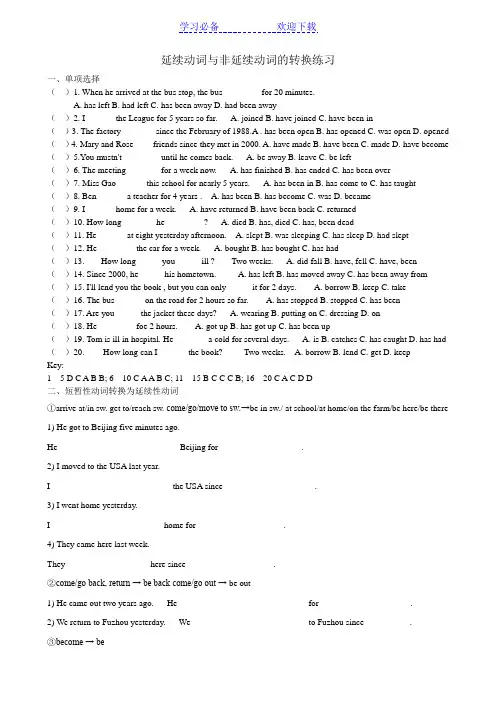
延续动词与非延续动词的转换练习一、单项选择()1. When he arrived at the bus stop, the bus ________ for 20 minutes.A. has leftB. had leftC. has been awayD. had been away()2. I ______ the League for 5 years so far. A. joined B. have joined C. have been in()3. The factory _______ since the February of 1988.A . has been open B. has opened C. was open D. opened ()4. Mary and Rose ____friends since they met in 2000. A. have made B. have been C. made D. have become ()5.You mustn't ________ until he comes back. A. be away B. leave C. be left()6. The meeting _______ for a week now. A. has finished B. has ended C. has been over()7. Miss Gao ______ this school for nearly 5 years. A. has been in B. has come to C. has taught()8. Ben ______ a teacher for 4 years . A. has been B. has become C. was D. became()9. I ______ home for a week. A. have returned B. have been back C. returned()10. How long _______ he ________ ? A. died B. has, died C. has, been dead()11. He ______ at eight yesterday afternoon. A. slept B. was sleeping C. has sleep D. had slept()12. He ________ the car for a week. A. bought B. has bought C. has had()13. -----How long _____ you _____ ill ? -----Two weeks. A. did fall B. have, fell C. have, been()14. Since 2000, he _____ his hometown. A. has left B. has moved away C. has been away from()15. I'll lend you the book , but you can only _____ it for 2 days. A. borrow B. keep C. take()16. The bus ______ on the road for 2 hours so far. A. has stopped B. stopped C. has been()17. Are you _____ the jacket these days? A. wearing B. putting on C. dressing D. on()18. He ________ foe 2 hours. A. got up B. has got up C. has been up()19. Tom is ill in hospital. He _______ a cold for several days. A. is B. catches C. has caught D. has had ()20. ----- How long can I ______ the book? ------ Two weeks. A. borrow B. lend C. get D. keepKey:1---5 D C A B B; 6---10 C A A B C; 11---15 B C C C B; 16---20 C A C D D二、短暂性动词转换为延续性动词①arrive at/in sw. get to/reach sw. come/go/move to sw.→be in sw./ at school/at home/on the farm/be here/be there1) He got to Beijing five minutes ago.He ________ _________ _________ Beijing for _________ _________.2) I moved to the USA last year.I ________ ________ __________ the USA since __________ __________.3) I went home yesterday.I _______ ________ _________ home for _________ __________.4) They came here last week.They _________ _________ here since _________ __________.②come/go back, return → be back come/go out → be out1) He came out two years ago. He _________ __________ _________ for __________ __________.2) We return to Fuzhou yesterday. We ________ ________ _________ to Fuzhou since __________.③become → be1) I became a teacher in 2000. I ________ __________ a teacher for _________ _________.2) The river became dirty last year. The river _________ _________ dirty for _________ __________.④close → be closed open → be open1) The shop closed two hours ago. The shop ________ _________ _________ for _________ _________.2) The door opened at six in the morning. The door ________ ________ ________ for six hours.⑤get up → be up;die → be dead;leave sw. → be away from sw.fall asleep/get tot sleep → be asleep;finish/end → be over;marry → be married;1) I got up two hours ago. I ________ ________ ________ since ________ ________.2) He left Fuzhou just now. He _______ ________ ________ _________ Fuzhou for five minutes.3) My grandpa died in 2002. My grandpa _______ _______ ________for _______ ________.4) The meeting finished at six. The meeting ________ ______ ______ for six hours.5) I got to sleep two hours ago. I ________ _________ _________ since _________ _________.6) They married in 1990. They ________ _________ __________since _________.⑥start/begin to do sth. → do sth. ;begin → be on1) I began to teach at this school in 1995. I ____ ____ at this school since ____.2) The film began two minutes ago. The film ____ ____ ____ for ____ ____.⑦borrow → keep;lose → not have ;buy → ha ve ;put on → wear catch/get a cold → have a cold;get to know → know1) They borrowed it last week. They _________ _________ it since __________ __________.2) I bought a pen two hours ago. I _________ _________ a pen for ________ __________.3) I got to know him last year.I _______ _______ him since __________ __________.4) I put on my glasses three years ago. I __________ __________ my glasses for _________ _________.⑧have/has gone to → have been inHe has gone to Beijing. He ____ ____ _____ Beijing for two days.⑨join the league/the Party/the army → be a league/a Party member/a soldier→ be a member of the league/the Party → be in the league/the Party/the army1) He joined the league in 2002.He ________ _________ a _________ _________ for two years.He _______ _________ a __________ ___________ the __________ for two years.He ____________ ___________ ___________ the league for two years.2) My brother joined the army two years ago.My brother ________ __________ a ___________ for ___________ ___________.My brother __________ ___________ in ____________ ___________ for two years.三、用have(has) been 或have(has) gone 填空。
初中英语语法课件-延续性动词和非延续性动词

非延续性动词又叫终止性动词、瞬间动词,表示动作或 过程是短暂瞬间完成的。不可以和表示一段时间的状语 连用。 I haven’t come here for 3 weeks. 我有了周没来这里了。 (在否定句中能与表示时间段的状语连用)
非延续性动词与 延续性动词间的转换
She left the company three hours ago. 她3个小时前离开了公司。
He has been in the Party for 2 years. 他入党两年了。
常见的非延续性动词和与之相应的延续性动词的对照
非延续性
延续性
(短语)动词 (短语)动词
leave
be away
buy
have
die
be dead
become
be
put on
wear
join
be in
常见的非延续性动词和与之相应的延续性动词的对照
play 玩 drink喝 li read读 wait等
have有 wear穿 stand站 walk 走
常见的延续性动词
非延续性动词
非延续性动词又叫终止性动词、瞬间动词,表示动作或过 程是短暂瞬间完成的。不可以和表示一段时间的状语连用。 I bought my car last year. 我去年买的车。 (在肯定句中与表示时间点的状语连用)
非延续性
延续性
(短语)动词 (短语)动词
borrow
keep
begin/start be on
finish
be over
get to know
know
get out
be out
catch a cold have a cold
非延续性动词 和延续性动词
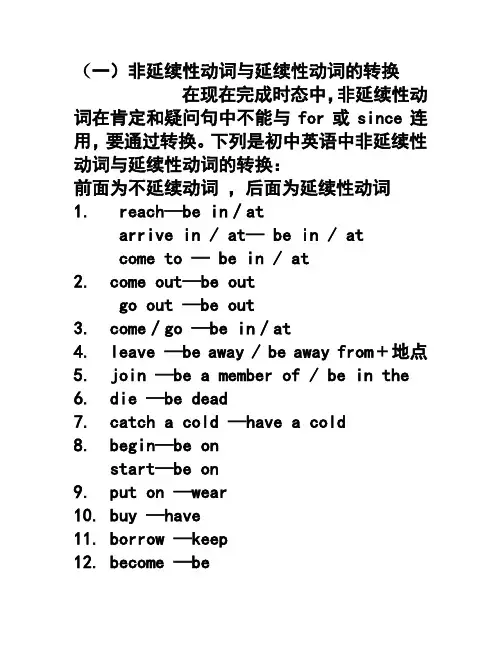
(一)非延续性动词与延续性动词的转换在现在完成时态中,非延续性动词在肯定和疑问句中不能与for或since连用,要通过转换。
下列是初中英语中非延续性动词与延续性动词的转换:前面为不延续动词,后面为延续性动词1. reach—be in/atarrive in / at— be in / atcome to — be in / at2. come out—be outgo out —be out3. come/go —be in/at4. leave —be away / be away from﹢地点5. join —be a member of / be in the6. die —be dead7. catch a cold —have a cold8. begin—be onstart—be on9. put on —wear10. buy —have11. borrow —keep12. become —be13. fall asleep —be asleep14. fall ill — be illfall sick — sick15. open —be open16. lose —be lost/not have17. get to know —knowbegin to know —know18. go to sleep —sleepget to sleep —sleep19. get up —be up20. close —be closed21. finish / end —be over22. move —be out of23. break —be broken24. marry —be married25. go —be away26. wake —be awake27. open — be open28. close — be closed29. catch a cold — have a cold30. go out— be out.。
Article02学习资料
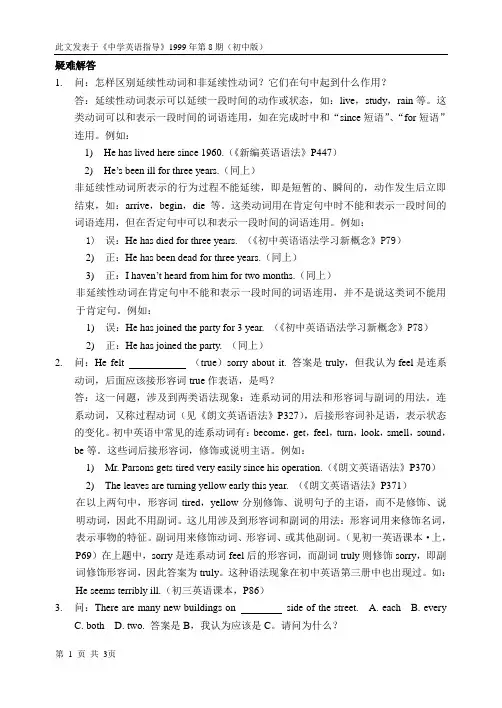
疑难解答1.问:怎样区别延续性动词和非延续性动词?它们在句中起到什么作用?答:延续性动词表示可以延续一段时间的动作或状态,如:live,study,rain等。
这类动词可以和表示一段时间的词语连用,如在完成时中和“since短语”、“for短语”连用。
例如:1)He has lived here since 1960.(《新编英语语法》P447)2)He’s been ill for three years.(同上)非延续性动词所表示的行为过程不能延续,即是短暂的、瞬间的,动作发生后立即结束,如:arrive,begin,die等。
这类动词用在肯定句中时不能和表示一段时间的词语连用,但在否定句中可以和表示一段时间的词语连用。
例如:1)误:He has died for three years. (《初中英语语法学习新概念》P79)2)正:He has been dead for three years.(同上)3)正:I haven’t heard from him for two months.(同上)非延续性动词在肯定句中不能和表示一段时间的词语连用,并不是说这类词不能用于肯定句。
例如:1)误:He has joined the party for 3 year. (《初中英语语法学习新概念》P78)2)正:He has joined the party. (同上)2.问:He felt (true)sorry about it. 答案是truly,但我认为feel是连系动词,后面应该接形容词true作表语,是吗?答:这一问题,涉及到两类语法现象:连系动词的用法和形容词与副词的用法。
连系动词,又称过程动词(见《朗文英语语法》P327),后接形容词补足语,表示状态的变化。
初中英语中常见的连系动词有:become,get,feel,turn,look,smell,sound,be等。
这些词后接形容词,修饰或说明主语。
延续性动词和非延续性动词考点分析
延续性动词和非延续性动词考点分析作者:来源:《初中生·考试》2011年第07期动词按其动作发生的方式、动作发生过程的长短,可分为延续性动词和非延续性动词。
1. 延续性动词和非延续性动词的概念1)延续性动词:表示可以延续的动作,且可以产生持久影响。
如:have,keep,know,learn,lie,live,read,sing,sleep,stand,stay,wait,walk,watch等。
如:I have lived here for ten years.我在这已经住了十年。
2)非延续性动词:又称为终止性动词或瞬间动词。
表示不能延续的动作,一旦发生就立即结束。
如:finish,begin,come,go,open,close,leave,arrive,reach,get to,buy,borrow,lend等。
2. 延续性动词的用法延续性动词常用于现在完成时的句子中,可与表示一段时间的时间状语连用。
如:for ten years,since 2008,how long等。
如:I have learned English since 2002.自从2002年,我就学英语了。
3. 非延续性动词的用法1)非延续性动词不能与how long引导的疑问句连用。
如:这本词典你买了多久?误:How long have you bought the dictionary?正:How long have you had the dictionary?你哥哥参军多久了?误:How long has your brother joined the army?正:How long has your brother been in the army?【体验中考】How long have you ______?For three days. (2010年滨州卷)A. got a headacheB. fallen illC. caught a coldD. had a cough[解析]get a headache(头疼),catch a cold(感冒),fall ill(生病)都是表示暂时性的动作,不能与表示一段时间的how long连用,答案为D。
英语知识 _ 初中英语,延续性动词和瞬间性动词的用法
一、延续性动词延续性动词,表示的动作不但可以延续,而且可以产生持久的影响。
常见的这类动词有:b e,h a v e,ke e p,k n o w,l e a r n,l i e,l i v e,re a d,s i n g,s l e e p,s t a n d,s t a y,w a i t,w a l k,w a tc h等。
延续性动词的用法很广,但常见于现在完成时中的句子中,且常与f o r,h o w,l o n g,s i n c e 等引导的表示一段时间的状语或状语从句连用。
例如:I h a v e l e a r n e d m o re t h a n1000C h i n e s e w o rd s s i n c e I c a m e t o C h i n a.自从来到中国,我已经学会了l千多个汉字。
I h a v e ke p t t h e p i c t u re f o r a b o u t t h re e y e a r s.。
这张画我保存了大约三年二、瞬间性动词瞬间性动词,又称为终止性动词或非延续性动词,它表示的动作不能延续,也就是说动作一旦发生就立即结束,并产生某种结果。
常见的这类动词有:a c c e p t,a r r i v e,b ec o m e,b e g i n,b o r ro w,b re a k,b u y,c a tc h,c l o s e,c o m e,d i e,e n d,f a l l,f i n i s h,g e t,g i v e,g o,j o i n,l e a v e,p u t,re a c h,re c e i v e,sh u t,s t a r t,s t o p等。
用在现在完成时要注意下面三点:①瞬间性动词可直接用来表示某一动作的完成。
例如:T h e y h a v e re a c h e d S h a n g h a i.他们已经到达了上海。
初中英语同义句转换的九种类型
初中英语同义句转换的九种类型同义句转换题是近几年中考英语的一个常考题型,其出题形式通常是同时给出两个句子,第一句完整,第二句中设有几处空格,要求考生填入适当的词或词组,使第二句的意思与第一句意思相同。
它综合考查考生的语法、词汇、短语或习惯用语和句型结构等知识,要求运用所学的词汇、语法知识和句型结构填写句子,使句子结构完整、逻辑合理、语法知识无误、意思与所给句子相同。
通过对近几年的中考英语试题中同义句转换题的分析,我们发现中考英语同义句转换题主要考查以下几个方面:一、运用同义词(组)进行转换用同义词或同义词组对原句中的某些词或词组进行替换,注意转换后的词或词组的词形变化要与句子其他成分相适应。
如:1. That day we could see flowers here and there.That day we could see flowers __________.分析:答案为everywhere。
everywhere与here and there都表示“到处”。
2. The teacher always takes good care of the children in the school.The teacher always_______ ______the children well in the school.分析:答案为looks after。
take good care of与look after…well都表示“好好照顾”。
二、运用反义词(组)的否定式进行转换即用反义词或词组的否定式表达与原句相同的意思,主要考查学生对反义词(词组)的积累和换位思维的能力。
如:1. It’s clear that this visit is different from last time.It’s clear that this visit is not the___ ___last time.分析:答案为same as。
延续性动词 初中范围内
三、延续性动词与非延续性动词之间的转换
put on /wear, catch a cold/ have a cold
borrow/ keep, buy/have, open sth/ keep sth open, begin/start/ be on, die/ be dead, finish/be over, join/ be in或be a member of+ 组织机构,fall ill/ be ill, come here/be here, leave / be away,
英语中的延续性动词与非延续性动词解析
动词按其动作发生的方式、发生过程的长短可分为延续性动词与非 延续性动词。
一、延续性动词 1. 表示能够延续动作的动词:learn, work, stand, lie, know, walk, keep, have, wait, watch, sing, read, sleep,e, become/ be, fall asleep/ be asleep, get to (arrive/reach) /be (in), 等。
2. 延续性动词可以与表示时间段的状语连用。
(表示时间段的短语有: for+ 一段时间 for 2 years /since + 从句 since he came here /since+ 时间点名词 since last year /how long /for a long time 等)
二、非延续性动词 1. 非延续性动词也称终止性动词、瞬间动词, 表示不能延续动作的动词,这种动作发生后立 即结束。如:open, die, close, begin, finish, come, go, move, borrow, lend, buy, arrive, join等。 2. 非延续性动词在肯定句中与表示时间点的状 语连用。 例: He died 5 years ago. 3. 否定的终止性动词可以与表示时间段的时间 状语连用。 例: I haven' t left here for 3 years.
- 1、下载文档前请自行甄别文档内容的完整性,平台不提供额外的编辑、内容补充、找答案等附加服务。
- 2、"仅部分预览"的文档,不可在线预览部分如存在完整性等问题,可反馈申请退款(可完整预览的文档不适用该条件!)。
- 3、如文档侵犯您的权益,请联系客服反馈,我们会尽快为您处理(人工客服工作时间:9:00-18:30)。
go (get) out →be out,
put on→ wear;
初中英语语法 延续性动词与非延续性动词专项训练
1.
√
When he arrived at the bus stop, the bus ________ for 20 minutes. A. has left B. had left C. has been away D. had been away 2. I ______ the League for 5 years so far. A. joined B. have joined C. have been in 3. The factory ________ since the February of 1988. A . has been open B. has opened C. was open D. opened 4. Mary and Rose _______friends since they met in 2000. A. have made B. have been C. made D. have become 5.You mustn't ________ until he comes back. A. be away B. leave C. be left
8.Ben ______ a teacher for 4 years .
A. has been B. has become C. was
D.
became 9. I ______ home for a week. A. have returned B. have been back C. returned 10. How long _______ he ________ ? A. died B. has, died C. has, been dead
如何变换:
Come- be here
Go – 源自 be there leave→ be away, borrow→ keep, buy→ have, begin/start → be on, die→ be dead, move to→ live in, finish→ be over, join→ be in/be a member of,
16.The bus ______ on the road for 2 hours so far. A. has stopped B. stopped C. has been 17.Are you _____ the jacket these days? A. wearing
open sth.→ keep sth. open, feel ill→ be ill, get up→ be up,
become --- be,
come back --- be back,
fall asleep --- be asleep, get to/ arrive/reach --- be (in), leave --- be away from, get to know --- know,
√
√
√
√
6.The meeting _______ for a week now.
A. has finished B. has ended C. has been over
7.Miss Gao ______ this school for nearly 5 years. A. has been in B. has come to C. has taught
11. He ______ at eight yesterday afternoon. A. slept B. was sleeping C. has sleep D. had
slept 12.He ________ the car for a week. A. bought B. has bought C. has had 13.-----How long _____ you _____ ill ? -----Two weeks. A. did fall B. have, fell C. have, been 14.Since 2000, he _____ his hometown. A. has left B. has moved away C. has been away from 15.I'll lend you the book , but you can only _____ it for 2 days. A. borrow B. keep C. take
B. putting on C. dressing D. on 18.He ________ foe 2 hours. A. got up B. has got up C. has been up 19. Tom is ill in hospital. He _______ a cold for several days. A. is B. catches C. has caught D. has had 20.----- How long can I ______ the book? -----Two weeks. A. borrow B. lend C. get D. keep
初中英语延续性动词与非延续性动词
延续性动词表示能够延续的动作,这 种动作可以延续下去或产生持久影响。 如:learn, work, stand, lie, know, walk, keep, have, wait, watch, sing, read, sleep, live, stay等。 终止性动词也称非延续性动词、瞬间动 词或短暂性动词,表示不能延续的动作, 这种动作发生后立即结束。如open, close, finish, begin, come, go, arrive, reach, get to, leave, move, borrow,buy等。
